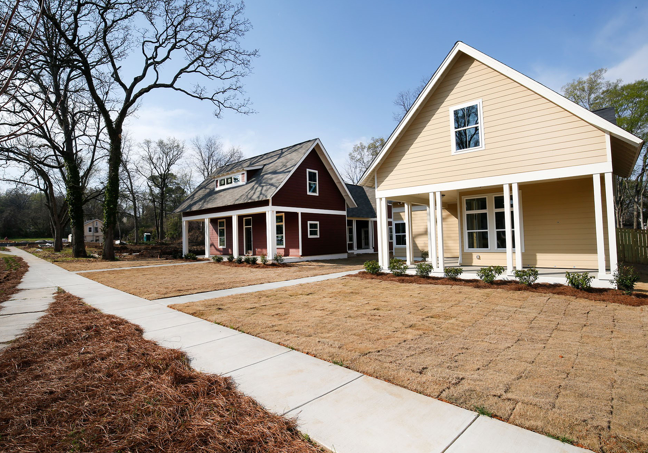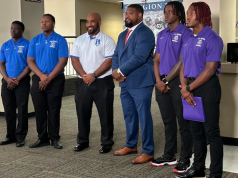
The city of Birmingham is comprised of 99 neighborhoods, but one is most dear to Myeisha Hutchinson’s heart – Woodlawn.
An area 15 blocks long by several blocks deep on the north side of the railroad that first defined Birmingham Alabama’s largest city, suburban Woodlawn boomed before World War II, full of young families and excitement.
A decade later, new interstates hemmed Woodlawn in, changing the neighborhood.
It’s Hutchinson’s home, one she shares with her grandmother and multiple generations. As Woodlawn Community President, she’s seeing a rapid reformation.
“We started five years ago. Now we’re in the toddler stage, moving to adolescence,” Hutchinson said. “What we’re doing in Woodlawn is for the next generation and for generations to come.”
The growth is visible. Wood Station is a mixed-use housing development, and nearby are affordable single-family cottages, with architecture that echoes Woodlawn’s glory days.
The Woodlawn Foundation drives the changes. Locally, it’s referred to as the “quarterback” of a collaborative group of partners and volunteers trying to break the cycle of poverty and fill community needs.
“The work we’ve done here has been life-altering,” said Mashonda Taylor, Community Relations Officer for Woodlawn Foundation. “I see families with a glimmer of hope, who only want to walk safely down the street and go to quality schools.”
The James Rushton Early Learning and Family Success Center sits off a busy street corner in the neighborhood, in a renovated bank building. It provides services for 100 preschoolers with classrooms and indoor/outdoor play areas.
A few blocks away, Woodlawn High School is a magnet school that allows students to begin taking no-cost college courses when they arrive as ninth graders, thanks to the foundation.
The Woodlawn Foundation’s work produces new, affordable homes and a college-prep curriculum for historic Woodlawn High School.
“We are creating an education pipeline, from cradle to college and beyond,” Hutchinson said. “Early childhood education and college exposure makes a difference. The college credits are a game changer.”
As team quarterback, Woodlawn Foundation works with businesses and business leaders across the metro. As with success in football, relationships are key, and the foundation has a solid one with Birmingham-based Regions and its North Central Alabama Area President, Leroy Abrahams.
“Regions is one of our biggest partnerships,” Taylor said. “Leroy Abrahams serves on the board. He brings insight, asks the hard questions and always pushes us forward.”
Pushing forward means visual, tangible change.
The Woodlawn Foundation “acquired hundreds of properties in this area that were vacant houses, vacant lots, burned out houses – all with very challenging titles – and built 64 beautiful townhouses that offer affordable housing for low- to-moderate-income persons,” said Paul Carruthers, the Community Affairs Manager for Regions.
Regions provided financing for the Wood Station project through a Low Income Housing Tax Credit, and donated property for revitalization efforts.
“I remember the first time I came out here several years ago, when this was just a dream,” said Ann Forney, who works with Regions’ corporate contributions. “To see the houses here and know how it will impact the residents is a really wonderful feeling.”
It’s only the beginning.
“When I started here in 2012, I was looking for something with a purpose. I found it with people who wanted to do more,” Taylor said. “I’ve seen Woodlawn grow, and I’m so excited to see what it will be like in the very near future.”
See more at www.doingmoretoday.com.




